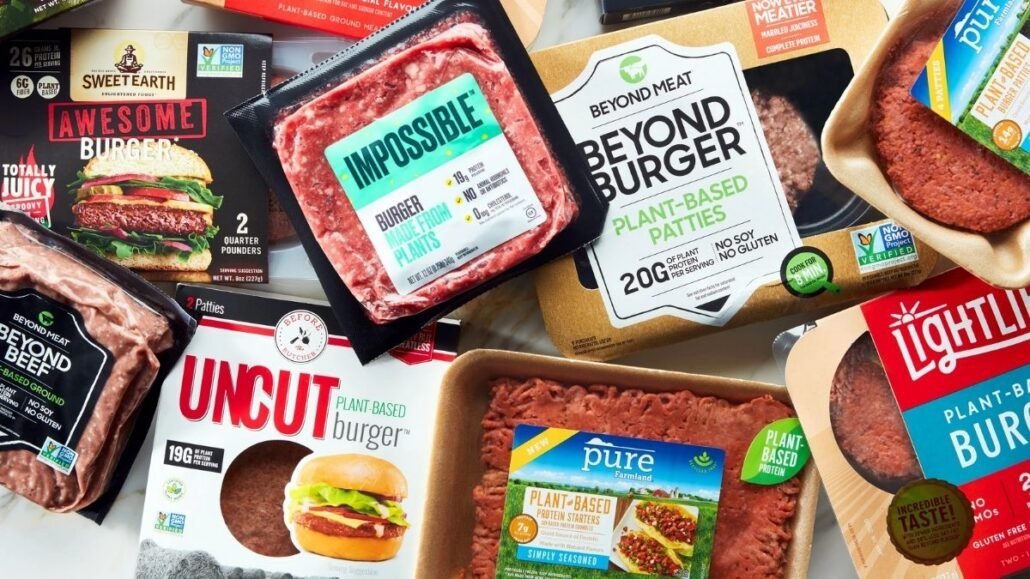Food companies are creating plant-based animal meats in response to the increased emphasis on consuming more plant-based foods. Following the rise of the veganism movement in the 2010s, supermarket shelves now stock plant-based versions of beef, tuna, shrimp, and eggs.
What is Plant-Based Meat?
Simply defined, plant-based meat is plant-based cuisine that mimics the appearance, feel, smell, and flavour of meat. This food category includes any “meat substitute” food that is prepared without the use of any animal ingredients. Soy, peas, beans, mushrooms, mung beans, and wheat gluten are often used to make plant-based meats (also known as seitan).
The most “advanced” plant-based meats are frequently a combination of several of those proteins, with natural colours added to make the meat seem red and brown. Plant oils are frequently used to enhance moisture, taste, and the look of marbled fat to meat.
Plant-based meats are known to be vegetarian. While plant-based sausages, meatballs, and other typical meat-related items are available, not all are “veggie meats”. Some items aren’t vegan because they contain emulsifiers like eggs or employ dairy products for taste or texture enhancement. When ordering these products at a restaurant, even vegetarians should be cautious.
Many meat eaters are inquisitive about Is it true that meat substitutes made from plants are healthier?
Most plant-based foods are equivalent in calories to traditional meats. The primary distinctions are that plant-based meats do not include cholesterol, are typically higher in salt, and contain a small amount of fibre (which meat does not include).
Choosing plant-based meat substitutes can assist to reduce the dangers of eating too much meat. Variety, like with any diet, is the spice of life; yet, eating too often of anything may be harmful. This is why it’s advised that we consume a lot of plant-based meals, especially those that are called “whole foods” — that is, unprocessed, minimally processed foods.These include leafy green vegetables, rice , whole-grain bread, and fruits.
The Benefits of Plant-Based Meat:
- More nutritious
Plant-based meats, as previously said, appear to be more healthy on the overall, including fewer calories, saturated fat, and cholesterol per serving while increasing fibre and protein consumption. Vegetables, which offer their own vitamins, minerals, and other micronutrients, are usually included as well.
- More eco-friendly
Plant-based meats produce 90% fewer greenhouse emissions than traditional animal protein synthesis. They also don’t rely on land use changes the way livestock farming does – animal agriculture is responsible for 80% of deforestation worldwide. One of the most significant contributors to climate change is this. Plant-based meats completely avoid this issue, as well as the water and nutrient contamination that is rampant in animal agriculture.
There is no need to slaughter any animals to make plant-based foods, which is a huge gain for animal rights activists all around the world.
Companies producing these plant-based foods:
Good dot
Veggie champ
Vezlay
Vegeta Gold
Imagine meats
Plant-Based Meat: A Meat Alternative for the Future?
Plant-based meats are not only here to stay, but they may also assist to redefine the food sector as a whole, as seen by consumer demand and good reaction over the previous several years. Plant-based meats represent the sort of change the earth needs at a time when the climate catastrophe is wreaking havoc, and many individuals are suffering negative health effects from consuming too much conventional meat.
In general, plant-based foods are the healthier option when compared to animal meats. Nonetheless, because plant-based meats are heavily processed, completely replacing animal proteins with plant-based meats may not be the greatest path for the future of food. The trick here may be to integrate them into your diet in moderation, as a meat substitute but not as a complete replacement.
This advice is also applicable to people who avoid using animal products entirely. The goal is to enrich one’s diet with more complete foods and plant-based protein sources, such as quinoa, lentils, beans, pulses, and nuts, rather than relying heavily on such animal substitutes.
So, the next time you go grocery shopping, try plant-based meat and see for yourself how beneficial it is for the environment.
